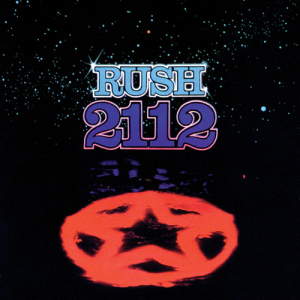2112 is both the name of the album and the suite that fills side one. Righting the mistakes they made with “The Fountain Of Lamneth”, this time the guys provide a back story, as well as context for each of the seven sections, helpfully printed on the gatefold and banded for clarity on the vinyl itself. They may not be the only guys to envision a world without music, or a futuristic society seemingly reserving technology for those in power, but using an Ayn Rand novella as inspiration, Rush manages to create a piece that celebrates music and its importance to the suburban kids who discover and play it.
Neil Peart’s narrative is fairly basic: in a repressed society, the protagonist finds a guitar, attempts to impress the elders with it but is rejected, and takes his life. Or something. It’s best appreciated in context, in the time it takes to hear the side. An “Overture” wisely demonstrates various themes to be heard, and is catchy as heck. The priests in “The Temples Of Syrinx” have their story and purpose shouted by Geddy Lee over heavy metal riffing, until an acoustic motif brings in silence. “Discovery” is an effective sound painting, beginning with water effects as a guitar is picked up and brought into tune in real time, leading to patterns that form the song itself. A progression into “Presentation” plays both sides of the conversation with the priests, alternating strumminess with heavy responses, including a reprise of the “Syrinx” theme. “Oracle: A Dream” begins gently but escalates in volume and dynamics to match the amazing journey, real or imagined. It’s the shortest segment, structured similarly to “Soliloquy”, which illustrates the narrator’s despair via Geddy’s histrionic delivery. “The Grand Finale” plays around with some of the themes before marching to Armageddon and the announcement from some authority that “we have assumed control”. Does this mean that the priests have effectively quashed the rebellion, or have they themselves been vanquished by some intergalactic opponent? Whatever the ending, it’s still the band’s best narrative.
The second side is all songs, unconnected but mostly good. Despite a corny Oriental quote, “A Passage To Bangkok” is one of the most vague celebrations of cannabis on record, disguised as a travelogue. “The Twilight Zone” is an overt tribute to Rod Serling’s series, and not very exciting. “Lessons” was written solely by Alex Lifeson, and provides some decent platitudes to be excerpted for high school yearbooks, while “Tears” is a Geddy composition and a rarity in that it's a lament for a failed romance, accented by Mellotron strings and flute. In case that’s too wimpy for you, “Something For Nothing” ends the album with another statement of individual philosophy, balancing acoustic picking and heavy riffing for a strong finale.
2112 was the first Rush album all fans, past, present and future, could agree on, so it wasn’t much of a surprise that it was one of the first Rush albums to be given special treatment. The Deluxe Edition featured updated artwork, and was available with either a DVD or Blu-ray with a 5.1 surround mix, a graphic novel interpretation, and three live bonus tracks from five years later. Two of those are “Overture” and “Temples Of Syrinx”, which have never left their set. (Once 40th Anniversary Editions became A Thing, 2112 got expanded yet again, with alternate live versions of the suite, “Something For Nothing”, and “Twilight Zone” from the subsequent tour, five modern covers by the likes of Steven Wilson and Foo Fighters, and a DVD with vintage footage. Oh, and new artwork.)
Rush 2112 (1976)—3½
2012 Deluxe Edition: same as 1976, plus 3 extra tracks
2016 40th Anniversary Edition: same as 1976, plus 13 extra tracks (and DVD)

I thought when I was in high school and was reading an Ayn Rand novel there had to be some link between it and 2112. My classmates laughed. Nice to see I wasn't totally Stage Left.
ReplyDelete